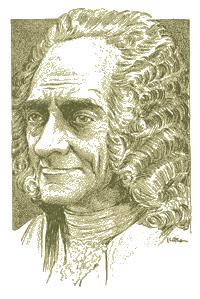 THIS brilliant playwright is known to the world today not by his own name, but simply as "Voltaire," the name he adopted after the successful production of his first play, Oedipe, in 1718. He was the son of a middle class family and was educated by Jesuit priests. From his earliest youth he seems to have been imbued with a spirit of skepticism and rebellion against intolerance. This characteristic which he was at no pains to hide, twice brought him imprisonment in the Bastille, and at a later date, periods of exile from France.
THIS brilliant playwright is known to the world today not by his own name, but simply as "Voltaire," the name he adopted after the successful production of his first play, Oedipe, in 1718. He was the son of a middle class family and was educated by Jesuit priests. From his earliest youth he seems to have been imbued with a spirit of skepticism and rebellion against intolerance. This characteristic which he was at no pains to hide, twice brought him imprisonment in the Bastille, and at a later date, periods of exile from France.
One such exile in England brought Voltaire the acquaintance of the important contemporary English writers. Indeed, his writings were bringing him such fame outside of France that he corresponded with some of the greatest people of the day including Catherine the Great of Russia. About this time he spent several years in Berlin whither he had gone at the invitation of Frederick the Great of Prussia. During his stay in Berlin, Lessing, who was later to become the first great German dramatist, was employed by Voltaire in making translations.
The play, Oedipe, was written when Voltaire was but nineteen. Its production five years later gave him almost at once first place among living French dramatists. Voltaire had the supreme dramatic gift of portraying sharp conflict and this is the secret of the success of his best tragedies: "the conflict between patriotism and love in Brutus; between love and religious duty in Zaïre; between love and filial obedience in Alzire and Tancrede." If a love interest was not present in the plot Voltaire purposed to borrow, he nearly always invented one or borrowed one from some other source. He was the first French playwright, too, to draw plot material from such distant and little known sources as China and South America.
At various times during his literary career, Voltaire produced about a dozen comedies. From a very slight study of these it is obvious that his forte lay in tragedy rather than in the lighter touch required by comedy.
In his younger days, Voltaire expressed a great admiration for Shakespeare, but as his own position as a dramatist and critic became more firmly established, he seemed to think that to belittle Shakespeare made Voltaire greater. Actually Voltaire lacked the understanding and sympathy which are essential to the great dramatist; but he could give theatrical credence to a thrilling story and at the same time preach a sermon. As a dramatist, Voltaire was not great; as the standard bearer of intellectual freedom, his influence is immeasurable.
Of the dramas which he produced, the two tragedies, Zaïre and Mérope are rated the best.
Purchase Books by Voltaire
Search eBay! for Voltaire collectibles